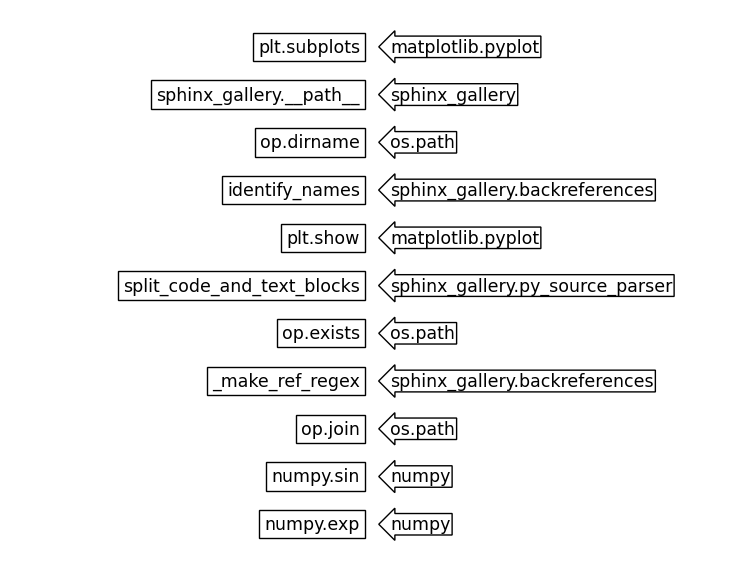Note
Go to the end to download the full example code or to run this example in your browser via JupyterLite or Binder.
Identifying function names in a script#
This demonstrates how Sphinx-Gallery identifies when
a function/method/attribute/object is used or class instantiated in a code block
a function/method/attribute/object/class is referred to using sphinx markup in a text block.
Sphinx-Gallery examines both the executed code itself, as well as the
text blocks (such as this one, or the one below) for these references and
identifies the module they belong to. This means that by writing
numpy.sin and numpy.exp here, they will be identified even though
they are not used in the code. This is useful in particular when functions
return classes (meaning it is not explicitly instantiated) – if you add them
to the documented blocks of examples that use them, they will be added to
backreferences.
This functionality is used to add documentation hyperlinks to your code (Add intersphinx links to your examples) and for mini-gallery creation (Add mini-galleries for API documentation).
# Code source: Óscar Nájera
# License: BSD 3 clause
# sphinx_gallery_tags = ["matplotlib","demo"]
import os.path as op # noqa, analysis:ignore
import matplotlib.pyplot as plt
import sphinx_gallery
from sphinx_gallery.backreferences import _make_ref_regex, identify_names
from sphinx_gallery.py_source_parser import split_code_and_text_blocks
filename = "plot_6_function_identifier.py"
if not op.exists(filename):
filename = (
__file__
if "__file__" in locals()
else op.join(op.dirname(sphinx_gallery.__path__[0]), "examples", filename)
)
_, script_blocks = split_code_and_text_blocks(filename)
names = identify_names(script_blocks, _make_ref_regex())
In the code block above, we use the internal function identify_names to
obtain all identified names from this file and their full resolved import
path. We then plot this below, where the identified names functions are
on the left and the full resolved import path is on the right.
fontsize = 12.5
figheight = 3 * len(names) * fontsize / 72
fig, ax = plt.subplots(figsize=(7.5, figheight))
ax.set_visible(False)
for i, (name, obj) in enumerate(names.items(), 1):
fig.text(
0.48,
1 - i / (len(names) + 1),
name,
ha="right",
va="center",
size=fontsize,
transform=fig.transFigure,
bbox=dict(boxstyle="square", fc="w", ec="k"),
)
fig.text(
0.52,
1 - i / (len(names) + 1),
obj[0]["module"],
ha="left",
va="center",
size=fontsize,
transform=fig.transFigure,
bbox=dict(boxstyle="larrow,pad=0.1", fc="w", ec="k"),
)
plt.show()

Total running time of the script: (0 minutes 0.607 seconds)
Estimated memory usage: 228 MB